- Home
- Jerry Spinelli
Knots in My Yo-Yo String Page 8
Knots in My Yo-Yo String Read online
Page 8
Sports, especially Little League baseball and Biddy basketball, brought me into a new kind of contact with African-American kids. Within the structure of organized games they ceased to be black and I ceased to be white. Instead we were teammates or opponents, identified by the color of our uniforms, not of our skin. The Red Sox. The Green Sox. The Colts. The Wolves. The fear in the streets did not follow me onto sandlots and hardwood courts.
On summer mornings we came from the East End and the West End to play on the Little League field by Stony Creek. In the afternoon the scene switched to the park basketball court. It was during those long hot days that I began to question everything I’d been taught by the countless separations between black and white in Norristown. And I came to see that color was the only difference, as people, between us. And that’s all it was: merely a difference, not an exclusion.
One of my best friends was Louis Darden, who was black. At one time or another Louis and I played on football, basketball, and track teams for Hartranft Elementary and Stewart Junior High. Louis was a happy-go-lucky guy. He was truly a player, not a worker, of games.
As the fastest boy at Hartranft, Louis was entered in the hundred-yard dash at the Norristown grade-school track-and-field meet. Something happened in that race which, even more than my own winning of the fifty-yard dash, remains as my most vivid memory of that day. The starter’s gun went off and the six runners bolted down the cinder track. At the halfway mark it was clear that Louis was not going to win. The runner from Gotwals, Robert Lee, was well ahead of the pack. But Louis was still in the hunt for a second- or third-place medal, and in the grandstand I stood and cheered him on. About twenty yards from the tape, Louis looked to his left and right at his cinder-churning competitors, and suddenly he eased up, he slowed to a kind of whimsical prance, he threw his arms into the air and as the others raced over the finish line, he laughed.
I was stunned. I was outraged. Not that he lost, not even that he gave up. It was his attitude that bothered me most, lah-di-dahing twenty yards from the finish line. How dare he race and not care! How dare he lose and laugh! Didn’t he know this was serious business? The championships of all the grade schools in Norristown, Pennsylvania! I—who took my sports, my baseball cards, my spelling, my life so seriously—could neither understand nor swallow it. Before all the world Louis Darden had disgraced himself. And what was he doing about it? He was laughing.
Two years later it was I who backed off and Louis who cared.
After school one day a group of us were playing basketball under a telephone-pole hoop outside Roger Adelman’s backyard. In addition to Roger and me, Louis Darden, Joe Portano, and a few others were there. It fell to Joe Portano to guard me, and that was a mismatch, for Joe was not much of a basketball player. Big and burly, he was more at home in the trenches of a football game. A mouse by comparison, I scooted around him and scored at will. I didn’t much note his increasing frustration until suddenly he kicked the ball into the weeds and came after me. He shoved me in the chest with the open palms of both hands. I went reeling backward. I regained my balance, and he slammed into me again, growling and scowling. And then Louis was between us, shoving Joe Portano in the chest, sending him backward, sending him away. There was no laughing this time, no lah-di-dahing, no messing around. For once Louis Darden was all business. Louis Darden, who hadn’t cared about winning for himself, made sure that I didn’t lose.
The boy who beat Louis in that hundred-yard dash, Robert Lee, was the same boy who’d clipped me on the chin when I was nine. I’m sure he had forgotten the incident long before we met in high school and became friends. By then my views were quite different. I was beginning to ask questions, though not yet out loud. And as was my habit, I fantasized.
I imagined Robert Lee and me back on that playground, and I imagined him again coming up to me and socking me. Only this time I don’t turn away. This time I do not fear his color. This time I know that we are the same, and fear is replaced by respect, and because I respect him as I respect myself, I sock him back. And the two of us stare wide-eyed at each other, and then we nod and shake hands and go off together to shoot some marbles.
Louis Darden, 1954.
God and Garfield
Shainline
In 1994 I received a letter from an elementary school reader that ended with this:
“I got my whole life planned out. First I’m gonna grow up. Then I’m going to college. Then off to the air force we go. Then I retire to Hawaii. Then I die. Does that sound good to you?”
What it sounded like was something I myself might have written once upon a time. Except that I would probably have closed with “And then I go to heaven.”
Heaven as I saw it would be the logical extension of my perfect attendance in Sunday school. As a military career can be deciphered from parade ribbons on a uniform, so my attendance record could be read on the lapel of my best sport coat. It started with a round blue pin, my reward for attending Sunday school thirteen weeks in a row—one fourth of a year. After twenty-six Sundays in a row, I turned in the blue pin for a red one. Another pin change occurred at week thirty-nine, and then after fifty-two straight Sundays—one year—I received a white pin, mine to keep forever.
A second year of perfect attendance (“perfect” in this case meaning at least forty-eight out of fifty-two Sundays) earned me a gold wreath to go around my white pin. Then came the bars—red, white, blue—one per year, hanging from the wreathed pin like a little ladder. In time the proof of my perfection was nearly as long as my lapel.
Sometime in junior high, probably at a school dance, I became self-conscious of my Sunday school decorations, and from then on they stayed home.
By then, too, my image of God was changing. Earlier I had pictured God as an old fellow, bearded, abiding somewhere beyond the whipped cream fluffiness of that cumulus cloud out over Elmwood Park. Except for God’s magical abilities, I would have been hard put to tell you the difference between him and the last surviving Civil War veteran.
As I got older, that view began to break up, to warp and fuzz over like a TV picture assaulted by interference. I waited and waited for the picture to clear, I fiddled with the dials, but I could not restore God’s image to the clarity of my early years. They had taken God out of the coloring book and told me he was not an old man after all but a spirit, that he was not there or there but everywhere, not then or then but beyond all whenevers.
Like most kids, I did not take readily to abstraction. Whether tin cans or gods, I felt most comfortable with presences that I could see, could touch, could kick if need be, could hear skittering along a sidewalk. I still spoke to God every night in my prayers, but my sense of a listener had dissipated. How do you speak to both the other side of your pillow and the other side of the Milky Way? I blew my prayers like bubbles into the air and trusted them to winds I could not feel. Hiding by the stone piles during the nighttime games of outs, I gazed into the starry sky and searched the constellations for my Sunday school lessons, and perhaps when I was swooning over time and galaxies, I was swooning over God as well.
If I ever came close to meeting God, I think it was not in the stars but in Garfield Shainline.
For a man with such a big name, Garfield Shainline was quite little, not as short as a dwarf, but almost. As a thirteen-year-old, I was already taller than he. It was said that he shopped for clothes in children’s departments. His white hair was crewcut. Tufts of black hair sprouted from his ears and from around a pea-size mole on his chin.
He worked at the YMCA in a wire mesh-enclosed compartment in the locker room. If you were taking a shower, you stopped at the cage and he handed you a small bar of white soap. I’m sure he had other duties, but to most of the boys in town, who never knew his name, that was the sum of who he was: the tiny old man at the Y who hands you soap.
But he was something else, too. When I was a teenager, he was my Sunday school teacher. Every Sunday morning we sat around a heavy round table in the Christian E
ducation Room of First Presbyterian: Garfield Shainline, Teddy Barrett, David Allen, Jay John, Douglas Nagy, me. We barely listened to him as we snickered and whispered and generally behaved like the immature adolescents that we were. We invented silly questions for him. We dared one another to yank out one of his mole hairs. Our favorite pastime was to pretend to drop something so that we had to bend under the table to retrieve it, there to behold the sight that brought us unending mirth: Garfield’s tiny feet, shod in tiny brown leather hightop shoes, dangling in the air like a five-year-old’s.
Each session concluded with an around-the-table prayer. Sometimes after the usual petitions for world peace and food for the hungry, someone would say, “And God bless Garfield and give him vitamins so he can grow and touch the floor.”
Occasionally Garfield gave us a mild scolding, but mostly he smiled good-naturedly or ignored our nonsense and went on with the important thing, the lesson. No matter how we treated him one Sunday, he was glad to see us the next. Undeserving as we were, we received only the highest recommendations in his prayer.
Upon reaching high school age, we left Garfield behind for another teacher. One day someone told us he was ill and in the hospital and would love to have a visit from his boys, as he called us.
I thought about going to see him, but there were too many other things to deal with: sports, grades, girls, friends. When I heard that he had died, I did not think much about it. I did not attend his funeral. Nor, I believe, did the others. But deep inside, even as I pretended to ignore my feelings, I sensed that something had changed forever. I pictured him in that hospital bed, waiting day after day for a visit that never came, and I knew—I knew—that in his final conscious hours, despite it all, he posted to heaven not a bitter thought about his boys.
Garfield Shainline has been long forgotten by most. Even my mother does not remember him. But I do. Oh, yes, I do. In these many years I have wished many times for him a second death, for myself a second chance. And still today he grows and grows inside of me, Garfield Shainline, the little man who hands you soap, and I have come at last to learn what he never knew he taught, that Garfield Shainline was not the teacher but the lesson.
Girls
The instant my mother saw my face, she gasped. It flashed through her mind that I had suddenly contracted measles or scarlet fever or some such red and rashy affliction. She pulled me farther into the light of the living room. It wasn’t a disease—it was lipstick, red lippy patches of it all over my face. I had just come home from a birthday party at Nona Norris’s. I explained that we had played some sort of game—the exact nature of which I don’t recall—that resulted in all the girls mobbing one boy and smooching him dead with their red, oh-so-grownup lipsticky lips. My mother told me to go upstairs and wash it off. She remembers almost wishing it had been measles. I was seven years old. And I already had a girlfriend.
Judy Brooks.
Judy Brooks lived in a yellow-brick front-porch twin house half a block up the street, at 718 George. She wore her brown hair in pigtails. She could tie a dress bow behind her back. She jump-roped double Dutch. She could scream high enough to make dogs howl. She played jacks and handclap games. She whispered and giggled a lot.
We began our relationship in first grade, after I entered Hartranft Elementary partway through the year. I don’t remember how I determined that she was my girlfriend, only that I thought of her that way, and that if someone said to me, as adults do, “Do you have a girlfriend?” I would say, “Yes.” And the adult would say, “Who?” And I would say, “Judy Brooks.”
There wasn’t much more to it than that. As a romance, it could be better described by what did not happen as by what did. We did not hold hands, we did not kiss, we did not walk to school together, we did not even talk much to each other. I did, however, accompany her parents to a dance recital that she participated in. And one Saturday morning I went with her to her dentist, Dr. Wenof on Marshall Street. I remained behind in the waiting room while she bravely followed the nurse out of sight. Minutes later I heard her scream. I tensed. I fretted. Was she screaming for me? What were they doing to her? Was it … The Needle? Should I charge in and rescue her? I stewed for another minute or two, then returned to my comic book.
When I say we did not kiss, I mean there was no we kissing. Never did she kiss me while I, at the same time, kissed her back. But once, I kissed her. Whether I wanted to or not.
One day when we were ten, Judy Brooks and I were on the other side of the tracks, near the creek. I was showing her the best kind of rocks to find salamanders under when Eddie Carcarey showed up. This was not good news. Eddie Carcarey and I had been having our problems. They had begun about a year before when I decided to organize a gang and invited Eddie to join. Eddie was one tough hombre, and I figured he would give the gang some muscle. He joined but then refused to abide by the gang’s only rule: to call me Captain. So I kicked him out. He retaliated by marching into our backyard in broad daylight and knocking over my mother’s basket of clothespins.
And now Eddie Carcarey was coming toward Judy and me with mischief in his eyes.
“Pick her up,” he said.
“Huh?” I said.
“Pick her up. Pick her up.” His red hair and freckles flared with menace.
Judy was terrified. I imagine I looked terrified to Eddie as well, but in fact I wasn’t. I had never picked up a girl before. I had never even thought about picking up a girl, but now that I was being ordered to do so, it didn’t seem like such a bad idea. In fact, considering that the girl to be picked up was Judy Brooks, it seemed like a darn good idea.
I had seen plenty of pickups on television and in the movies, mostly cowboys hoisting ladies in long dresses who had fainted or sprained their ankle. So I figured I knew the basic move.
“Okay,” I said, trying to sound scared.
While Judy stood rigid as a tree trunk, I positioned myself behind her and went through my pre-pickup sequence: spread and plant the feet, crouch, right arm behind her knee, left arm across her back, and—lift. In the movies the lady always came up smartly from the ground, as if she were on a swing, as if she were light as a balloon. It didn’t go quite that way for me.
When I lifted, Judy’s feet came up all right, as high as my shoulder, but the rest of her went down. Her head was around my knees, and now she was sliding toward the ground, her hand groping for my belt. I quickly dropped to one knee and propped her back against the other.
Eddie Carcarey sneered, “You’re weak as an ant.”
Maybe so, but I wasn’t through yet. Driven not by Eddie Carcarey’s sneer but by visions of Lash La Rue and Tex Ritter and how they would have done it, I pulled Judy into my butter pickle biceps, I squatted like a weightlifter, I took a deep breath, I heaved and grunted, and I picked her up. It wasn’t a classic—her head and knees were high while her rear end sagged in the middle, giving her a V-shape. My arms turned to stone, my knees buckled under me. But I thought hard of Lash and Tex, and I held it for a good five seconds before I let her down.
“Now kiss her,” Eddie said.
Good thing that’s what he said, because the only part of my body not in muscular shock was my lips. I gave her a quick peck on the cheek, and that, to my recollection, was the first time I ever kissed a girl.
Eddie Carcarey trotted off, no doubt pleased with himself for forcing me to perform two distasteful acts.
That was the year Judy Brooks broke up with me. Well, strictly speaking, she didn’t break up with me, she broke up with everyone. She announced that she was through with boys, she hated them all—“you all,” I believe, is how she put it. I tried to find a loophole, but no matter how I looked at it, I was a boy, I was one of “you all.” For the first time since first grade, I was single.
With a grim, gritting vengeance, I decided to retaliate by hating all girls, which I did successfully for three or four weeks—or was it three or four minutes? In any case, by sixth grade I had another girlfriend.
Bobbi Garber.
Like Judy Brooks, Bobbi Garber lived in the 700 block of George Street. She was one of three beautiful sisters, probably the most famous female threesome in town. The oldest sister, Randy, was Miss Montgomery County. Ruby was a cheerleader at Stewart Junior High. And the youngest, Roberta, called Bobbi, was in fifth grade, a year behind me, at Hartranft.
The Garber girls’ father, Bill, was a car salesman on Markley Street, by the brewery. When I was in eighth grade, he sold us our first car, a turtle-green 1952 Pontiac.
Bobbi was a spitfire tomboy. We rode bikes around the West End. We played in the street. And each school day at noon when classes let out for lunch, Bobbi waited with me at an alley that fed onto Chain Street half a block from school, next to Susan Davis’s father’s fish market. I was a lieutenant in the safety patrol, and it was my duty to stand at the alley and insure that the kids going home for lunch crossed it safely. I wore a white military-looking strap that circled my waist and looped up diagonally over one shoulder. Pinned to it was my badge, fancy silvered tin with an oval insert painted bright red. I guess I’ll never know which dazzled Bobbi more, me or the badge.
I never gave Bobbi Garber a kiss, but I did give her something much more serious, as meaningful a token of my affection as I could manage, and frankly, a fairly painful sacrifice. I gave her my yo-yo. I have since wondered if I truly gave it as a token of affection, or was I finally getting rid of those infernal knots? Whatever, the romance dissolved when I went off to junior high. I never got my yo-yo back.
In seventh grade I moved on to the next level of kissing: lip to lip (or to be precise, teeth to teeth). Until then I had never kissed a female, not even my mother, on the lips, unless you count a few times when our dog Lucky surprised me with a wet one.

 Who Put That Hair in My Toothbrush?
Who Put That Hair in My Toothbrush?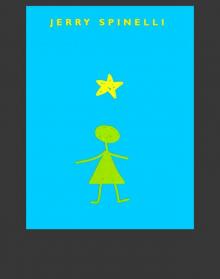 Stargirl
Stargirl Loser
Loser Jake and Lily
Jake and Lily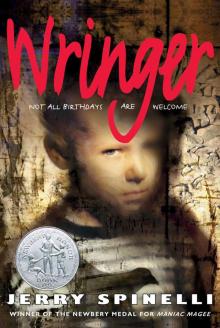 Wringer
Wringer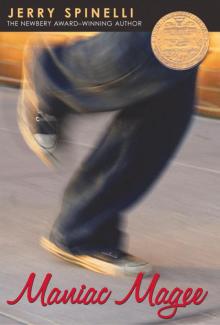 Maniac Magee
Maniac Magee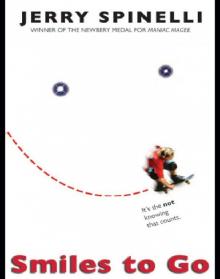 Smiles to Go
Smiles to Go Love, Stargirl
Love, Stargirl Hokey Pokey
Hokey Pokey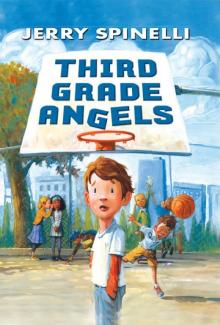 Third Grade Angels
Third Grade Angels Tooter Pepperday: A Tooter Tale
Tooter Pepperday: A Tooter Tale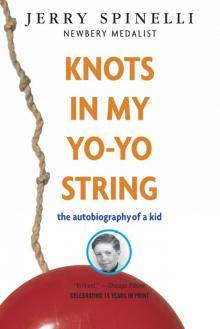 Knots in My Yo-Yo String Knots in My Yo-Yo String
Knots in My Yo-Yo String Knots in My Yo-Yo String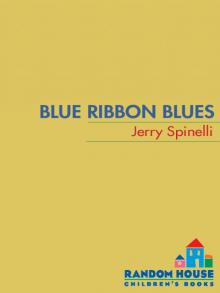 Blue Ribbon Blues: A Tooter Tale
Blue Ribbon Blues: A Tooter Tale The Bathwater Gang
The Bathwater Gang Crash
Crash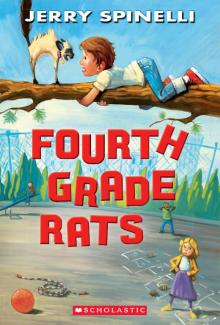 Fourth Grade Rats
Fourth Grade Rats Eggs
Eggs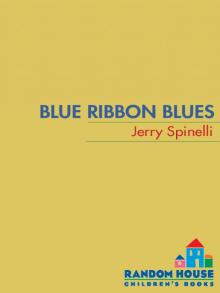 Blue Ribbon Blues
Blue Ribbon Blues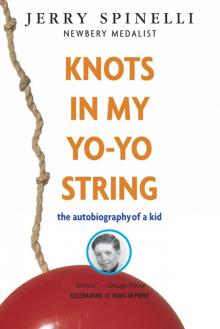 Knots in My Yo-Yo String
Knots in My Yo-Yo String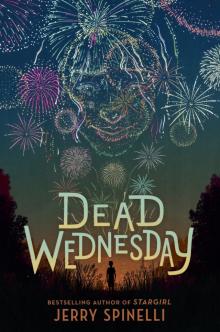 Dead Wednesday
Dead Wednesday Tooter Pepperday
Tooter Pepperday